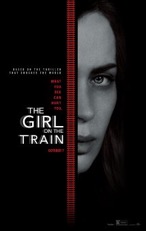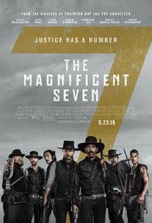November 2016
The Girl on the Train (R)
16/11/16 22:17 Filed in: 2016

Starring: Emily Blunt
October 2016
The below comments (in Black) were originally tweeted in Real-time from the back row of a movie theater and appear @BackRoweReviews. Though efforts were made to tease rather than ruin this movie’s memorable lines and moments, some spoilers may exist in the following evaluation (in Red). For concerns over objectionable content, please first refer to one of the many parental movie guide websites. All ratings are based on a four star system. Happy reading!

Rachel drawing in a notebook is different than in the book.
I applaud the writer for maintaining the POV juggling from the book. We’ll see how well it’s executed.
Rachel’s hands shake while applying lipstick. #Alcoholic
Powerhouse monologue in the bathroom. #EmilyBlunt
An actual AA meeting...merely referenced in the book.
“I ride the train.” Unusual occupation. #TicketsToNowhere
Bizarre depictions of people in the gallery paintings. #FracturedIdentities
“Don’t make it impossible for us to work together.” Too late.
“Your wife hit me on Friday night.” That’s different from the book.
“I’m afraid of myself.” With good reason, Rachel.
“I fell asleep. I let her go.” Horrific!
“Rachel is a sad person.” Not as sad as you, Tom.
#LisaKudrow holds an important key to Rachel’s blackouts.
Megan wants to go to the woods with Tom. Bad choice.
“In a way you killed her.” Nice try, Tom. #GuiltTrip
Anna has a heart shaped blood stain on her white sweater. Ironic.
Final analysis: a faithful adaptation that gets the broad strokes right, if not the fine details.
“There’s nothing so painful, so corrosive, as suspicion.” My favorite line from the book. #Freebie
Rating: 3 out of 4. Solid acting and writing are squandered by middling direction. Such potential here.
Based on the popular book of the same name by Paula Hawkins, The Girl on the Train tells its sordid story from the perspectives of three women whose lives are intertwined in ways that could only be feasible in a novel…or Hollywood production. The movie arrives less than two years after the book was published (January of 2015) and comes courtesy of screenwriter Erin Cressida Wilson and director Tate Taylor. Sparing you a long litany of book-to-movie comparisons, I’ll just say that despite numerous narrative alterations (like the accelerated revelation of Rachel’s employment status), the story remains fairly faithful (unlike its characters) to the source material. Some changes work extremely well: the decision to omit the physical relationship between Rachel (Emily Blunt) and Scott (Luke Evans) is a plus since the mere implication of impropriety works wonders dramatically and since the two of them hooking up was dubious from the start. On the flip side, there are several plot breakdowns in the film, most notably the scene where we learn Megan’s (Haley Bennett) fate, which is bracketed by Rachel losing and regaining consciousness. Is this climactic moment a dream, a hallucination or some mental reconstruction of how Rachel thinks the murder occurred? Since the answer is none of the above, this deviation from the POV structure that was established from the opening moments of the movie, muddies the plot stream and creates confusion during the most crucial scene in the film. It’s precisely this sort of story inconsistency that prevents the cinematic Train from achieving what Hawkins did so masterfully in her novel, which only reinforces the long maintained sentiment that the book is always better than the movie. So then, just as the characters attempt to learn the identity of the murderer in the movie, let’s seek to discover who’s at fault for the film’s flawed execution. We certainly can’t point a finger at the acting. Blunt (though far more petite than the novelized Rachel) delivers an authentic portrayal of the low ambition alcoholic, whose frequent blackouts makes her testimony of a perceived crime dubious at best. The supporting players—Rebecca Ferguson, Justin Theroux, Laura Prepon, Allison Janney, Lisa Kudrow, etc—all deliver fine performances too. Wilson does an admirable job of adapting Hawkins’ novel—no small task with its large cast of central characters, multiple perspectives, jumping timelines and carefully constructed, time-released revelations—so her efforts can’t be criticized either. Although the action moves from England in the book to the northeastern U.S. in the movie, the story works well enough in either setting, so no drawback there. Ultimately, the culprit for the film’s underachievement is its directing. One wonders why such a high profile, and potentially highly lucrative, property was turned over to a virtual unknown (Taylor’s only prominent films are 2008’s The Help and 2014’s Get on Up)? Why wasn’t David Fincher (Gone Girl), Denis Villeneuve (Prisoners) or another proven director tapped to helm such a multivalent, psychologically complex thriller? Taylor’s direction fails to plumb the depths of Hawkins’ nuanced characters and, instead, settles for a perfunctory, skin-deep methodology. This inability to tap into genuine human emotions and motivations is a massive missed opportunity since Hawkins’ yarn is so immediate and so rich in character…and so Hitchcockian (the story’s inciting incident is essentially Rear Window on a train). As was conveyed in many of Hitchcock’s films, all spectatorship is voyeuristic in nature. As such, we’re equally complicit in Rachel’s transgressive meddling when she peers out the train window and when she inserts herself into the lives of complete strangers. The film’s saving grace is its ability to confront us with this key concept from the book. However, in the end, Train is merely an adequate adaptation of the novel and will underwhelm its audience, especially those who’ve read the book. Well, I’d love to stay and chat some more about this film, but this is my stop.
The Magnificent Seven (PG-13)
06/11/16 00:17 Filed in: 2016

Starring: Denzel Washington
September 2016
The below comments (in Black) were originally tweeted in Real-time from the back row of a movie theater and appear @BackRoweReviews. Though efforts were made to tease rather than ruin this movie’s memorable lines and moments, some spoilers may exist in the following evaluation (in Red). For concerns over objectionable content, please first refer to one of the many parental movie guide websites. All ratings are based on a four star system. Happy reading!

“This valley is ours.” For the moment.
It takes a special kind of lowlife to tomahawk a woman.
“They’re better off without you.” Ha!
“Would you like to see another magic trick?” #IncredibleDisappearingEar
“Maybe my grandfather killed your grandfather.” #Bonding
“I believe that bear was wearing people clothes.” LOL
Chisolm eats a deer’s heart. Iron rich breakfast.
“Consider this a recall.” Ha!
“Statistically speaking, they should’ve hit something.” #ChrisPratt’s comedic timing is impeccable.
The “poking and sticking” scene is hilarious.
“I’ve always been lucky with one-eyed jacks.” Yeah!
#Bogue prays inside the church he burned down. That’s rich. #SinnersPrayer
Final analysis: a decent remake of the 1960 film and its #Kurosawa antecedent.
Rating: 3 out 4 stars. Formulaic, but still enjoyable with some great action and non-stop humor.
Based on the 1960 classic Western of the same name—which itself is based on the Japanese film Seven Samurai (1954), directed by Akira Kurosawa—The Magnificent Seven is an adequate remake of the seminal tale of a group of misfits defending a terrorized town from a land-grabbing lowlife and his posse of thugs. Barring a few minor variations, the new Magnificent tracks closely with the storyline from the 60s film and is a crowd-pleasing, yet safe, follow up. In the leading role is Denzel Washington, who plays Chisolm, the counterpart to Yul Brynner’s Chris Adams. Whereas Steve McQueen played the sidekick role with a sense of humor as dry as the original’s dusty desert setting, Chris Pratt’s cardsharp serves as a joke-a-minute funnyman in the new film. Ethan Hawke’s reluctant gunfighter mirrors Robert Vaughn’s shell-shocked sharpshooter, while Byung-hun Lee’s laconic, knife-throwing assassin resembles James Coburn’s similarly drawn character in the vintage version. Similarities between new/old members of the ragtag team diverge at this point with the diversity award going to the new film for including a black, a Mexican and a Comanche (along with an unofficial eighth member in the spirited widow, played by Haley Bennett) in the titular septet. Eli Wallach (in brownface) played the Mexican heavy, Calvera, in the 60s version, but here, Peter Sarsgaard plays the stone-cold Caucasian villain, Bartholomew Bogue. Another story deviation from the 60s movie, which was set mostly in Mexico, is that all of this film’s action takes place north of the border. The movie’s sets, props and costumes are all period appropriate, as would be expected, and the southwestern landscapes (shot in Arizona, Louisiana and New Mexico) are simply gorgeous. My one critique of Antoine Fuqua’s (who previously worked with Washington and Hawke in 2001s Training Day) direction is that he doesn’t give the establishing shots enough time to “breathe” before rushing off to the next bar fight or shootout. Okay, so I lied, I do have another issue with Fuqua’s helming, namely the blurry fight scenes. For his action sequences, Fuqua uses the same handheld camera with rapid-fire edits that you’d see in a blockbuster action film…and the results are nausea inducing. Not only is this brand of action scene anachronistic for the film’s milieu, but it may prove annoying for many non-gamers or anyone over 40. Still, the multi-vantage melees are spirited, fun and don’t overstay their welcome…much like the film itself. Although the movie’s linear, cause and effect narrative is predictable from start to finish; it delivers enough thrills and laughs to keep the audience engaged throughout. Though it fails to live up to its name, the new Magnificent isn’t a bad way to spend 90 minutes. Now it’s time for this review to ride off into the sunset. Happy trails, partner!